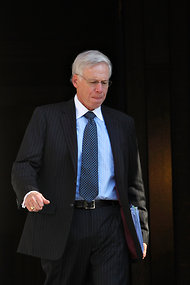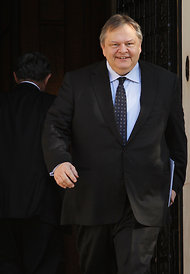 Petros Giannakouris/Associated PressCharles Dallara, the head of the Institute of International Finance, represents Greece’s private bondholders.
Petros Giannakouris/Associated PressCharles Dallara, the head of the Institute of International Finance, represents Greece’s private bondholders.
LONDON — Talks between Greece and private sector creditors over a restructuring of the country’s crushing debt paused on Friday amid a continuing disagreement over how much of a loss banks and investors should take on their holdings.
In a statement, Charles Dallara of the Institute for International Finance, the bank lobby that represents private sector bond holders, said that discussions had “not produced a constructive consolidated response by all parties, consistent with a voluntary exchange of Greek sovereign debt.”
The statement came at the conclusion of talks between Mr. Dallara and the Greek finance minister, Evangelos Venizelos, in Athens on Friday.
Related Links
While people involved in the talks described it as a negotiating tactic, the disagreement is a reminder of how wide the gap remains between the two sides, even after months of discussions, and underscores how close Greece is to defaulting on its debt.
At issue, bankers and government officials say, is less the 50 percent haircut that investors would absorb with their new bonds and more the coupon or interest these new instruments would carry.
 Petros Giannakouris/Associated PressEvangelos Venizelos, the Greek finance minister.
Petros Giannakouris/Associated PressEvangelos Venizelos, the Greek finance minister.
Investors are pushing for a higher interest payout to mitigate both their loss and the fact that their exposure to Greece will be lengthened considerable with the new bonds.
The International Monetary Fund and Germany, both of whom have become increasingly worried about Greece’s ability to service its debts as its economy continues to plummet, are pushing for a lower rate, which would ease Greece’s debt payments and force investors to take a bigger loss on their holdings.
As foreseen, the deal is expected to lower Greece’s debt to 120 percent of its gross domestic product by 2020 from about 150 percent currently. But the I.M.F. in particular has become pessimistic about Greece’s ability to recover economically and believes its debt burden must decrease at a faster rate.
Within the fund, as well as in Europe, there is a view that the private sector needs to pay a larger share. Europe’s sickly banks counter that they are in no position to take on more losses.
In its statement, the bank lobby said that “discussions with Greece and the official sector are paused for reflection on the benefits of a voluntary approach.”
The not-so-subtle message is that if Europe pushes too hard on this point, then the creditors can no longer accept the agreement as a voluntary one. This is important as an involuntary restructuring would be seen by creditors as a default and would trigger credit default swaps — a step Europe and Greece are trying hard to avoid.
One person involved in the discussions said that the move should be seen more as a negotiating tactic than a sign than a sign that Greece was going to default. The person, who spoke on condition of anonymity, said that the talks would resume Wednesday.
That may be so, but for every day’s delay, the stakes increase as Europe and the I.M.F. have said repeatedly that without a private sector deal, Greece will not get the 30 billion euros in bailout money that it needs to avoid bankruptcy.
Greece faces a critical 14 billion euro bond payment on March 20. A delegation from the I.M.F is due in Athens next week to start talks with the government on the progress or lack thereof in enacting major reforms and raising money via state asset sales.
The negotiations on the debt have been complicated by the increased influence of a bloc of investors, largely hedge funds, who have bought billions of euros of discounted Greek debt and have said they will not participate in a restructuring. They are betting that Europe will blink and give Greece its money, and because the deal would be voluntary, these holdouts would get their pay day.
With the breakup of the talks, and the increased threat of a default, these investors may well choose to participate in the deal — in the hopes of getting something as opposed to the very little they would get if Greece went bankrupt.
Article source: http://feeds.nytimes.com/click.phdo?i=77a459a7c18572b39bd32865e85caafb
Speak Your Mind
You must be logged in to post a comment.